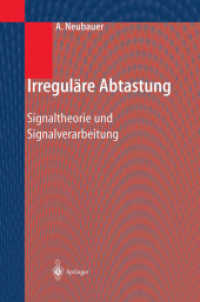- ホーム
- > 洋書
- > 英文書
- > Science / Mathematics
Full Description
Responding to the need for a timely and authoritative volume dedicated to this burgeoning and expansive area of research, this handbook will provide readers with a map of themes, topics, and arguments in the field of engineering ethics education (EEE).
Featuring critical discussion, research collaboration, and a team of international contributors of globally recognized standing, this volume comprises six key sections which elaborate on the foundations of EEE, teaching methods, accreditation and assessment, and interdisciplinary contributions. Over 100 researchers of EEE from around the globe consider the field from the perspectives of teaching, research, philosophy, and administration. The chapters cover fast-moving topics central to our current understanding of the world such as the general data protection regulation (GDPR), artificial intelligence (AI), biotechnology, and ChatGPT; and they offer new insights into best practices research to equip program leaders and instructors delivering ethics content to students.
This Open Access volume will be of interest to researchers, scholars, postgraduate students, and faculty involved with engineering education, engineering ethics, and philosophy of education. Curriculum designers, staff developers teaching pedagogical courses to faculty, and engineering professionals may also benefit from this volume.
The Open Access version of this book, available at http://www.taylorfrancis.com, has been made available under a Creative Commons Attribution-Non Commercial-No Derivatives (CC-BY-NC-ND) 4.0 license.
Contents
Introduction: Mapping engineering ethics education
Section 1: Foundations of engineering ethics education
Overview
1 The purposes of engineering ethics education
2 Ethical theories
3 Individual and collective dimensions of ethical decision-making in engineering
4 Reason and emotion in engineering ethics education
5 Professional organizations and codes of ethics
6 A post-normal environment-centered approach to engineering ethics education
7 Engineering ethics education and artificial intelligence
Section 2: Interdisciplinary contributions to engineering ethics education
Overview
8 Engineering ethics education through a critical view: some philosophical foundations
9 Sociological, Postcolonial, and Critical Theory Foundations of Engineering Ethics Education
10 Psychological Foundations of Engineering Ethics Education
11 Organization studies and engineering ethics education: Response-able engineering and education, situating ethics-in-practice
12 Ethics and engineering design foundations
13 Law in engineering ethics education: An exploration
Section 3: Ethical issues in different engineering disciplines
Overview
14 Ethical considerations in civil engineering
15 Ethical issues in mechanical and aerospace engineering
16 Ethical issues in electronic and electrical engineering
17 Ethics in chemical engineering
18 Ethical issues in software engineering
Section 4: Teaching methods in engineering ethics education
Overview
19 Literature review of teaching methods: Trends and ways forward to support engineering ethics instruction
20 Teaching ethics using case studies
21 Embedded ethics in problem design: The case of problem-based learning in engineering and science
22 Teaching responsible engineering and design through value-sensitive design
23 Ethics in service-learning and humanitarian engineering education
24 Arts-based methods in engineering ethics education
25 Reflective and dialogical approaches in engineering ethics education
Section 5: Assessment of different aspects of engineering ethics education
Overview
26 A framework for the assessment of ethical competencies and affective dispositions
27 Assessing attitudes and character in engineering ethics education: Current state and future directions
28 Employing epistemic micro-practices to assess progress and barriers in engineering students' ethics development
29 Aspirations for ethical education in engineering curricula envisioned through the quality lens of Goodlad typology
30 Assessing engineering ethics education leveraging stakeholder engagement in engineering programs
31 Two criticisms of engineering ethics assessment: The importance of behaviors and culture
Section 6: Accreditation and engineering ethics education
Overview
32 Foundational perspectives on ethics in engineering accreditation
33 Contextual mapping of ethics education and accreditation nationally and internationally
34 Accreditation and licensure: Processes and implications
35 A feminist critical standpoint analysis of engineering ethics education and the powers at play in accreditation, research, and practice
36 Accreditation processes and implications for ethics education at the local level








